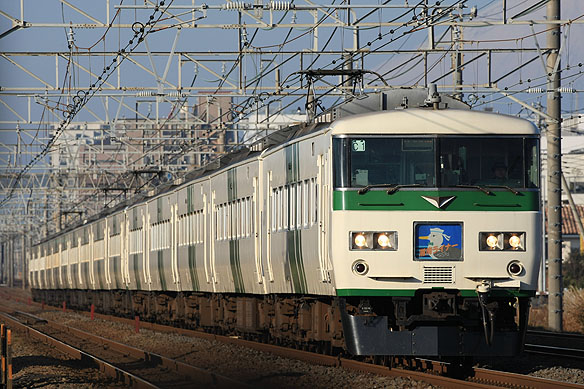Background and overview
Japanese National Railways (JNR) developed 185-0 series DC electric multiple
unit (EMU) developed from 117 series suburban-type EMU for use on the Tokaido
express services, replacing the superannuated 153 series currently used
on these services. They have the construction and performance for use on
both the intercity and ordinary services, consisting of 10 cars including
two 1st class cars, or 5 cars. They have better accelelrtion performance
and their maximum service speed is 110km/h. 185-0 series were able to operate
coupled to 153 series.
Car body
They have 19500mm long body. Their body design incorporates lightweight
shaped steel and pressed forming beam to realize a light weight body. Their
body skin features weatherproof steel sheet (Steel Plate Atmospheric) and
stainless plate for the wainscot for the prevent of corrosion. Their cab
end profile is different from earlier 183 series and 485 series intercity
EMUs. The noticeable difference over conventional JNR intercity trains
were having side windows designed to open and close. 1st class vehicles
incorporate single-hang unit assembled windows, and standard class vehicles
incorporate pairs of single-hang unit assembled windows. They are equipped
with roll-down curtains except for sliding curtains. 1st class vehicles
are equipped with a 1000mm wide single-leaf door and standard class cars
are two 1000mm wide single-leaf doors for using occasionally on commuter
services. Destination indicator screens are fitted on the side of the body.
Electric powered intake fan units are fitted on the both side of the air
conditioner, discontinuing fit ventilators on the roof. Their livery, which
differ from JNR intercity train standard colour scheme, is white with green
diagonal stripes. An air conditioner , AU71C, rated at 28,000kcal/h is
fitted on the roof of 1st class vehicles, and an air conditioner, AU75C,
rated at 42,000kcal is fitted of the roof of the others.
Bogies
Their bogies are DT32H/TR69K adopting air suspension bogies, which has
results of 485 series. Their bogies apply the single tread brake device
for motored bogies and the disk brake device for trailer bogies.
Traction unit and ancillary equipments
Eight series-wound brushed DC traction motors, MT54, with a power output
of 120kW are controlled by the armature-resistance traction control system,
CS43A, featuring holding brake. The gear ratio is 4.82. Class Moha185 vehicles
are equipped with a diamond-shaped current collector, PS16, and class Moha184
vehicles are equipped with a brush-less motor generator, DM106 with a power
output of 190kVA, for the auxiliary power supply for the first time among
JNR's EMU. 185-0 series adopt electromagnetic straight air brake. The rheostatic
brake is available.
Accommodation
1st class cars have reclining seating, R27B, with 1160mm seating pitch.
Standard class cars have switchable transverse seating, W17C, with 910mm
seating pitch. All vehicles are vestibuled and equipped with a Japanese
style toilet and a washroom made of FRP excepting class Moha184. Doors
between a passenger room and a vestibule are automatic. An AC duct is installed
above the ceiling and slit-shaped AC vents are featured in order to improve
interior design.
Operations
In 1981, 185-0 series were primarily intended to replace superannuated
153 series EMUs used on Izu express trains from Tokyo to the Izu Peninsula.
Then 185-0 series entered the "Odoriko" intercity services linking
Tokyo and Izukyu-Shimoda and Tokaido line commuter services. They started
"Shonan Liner" rapid services linking Tokyo and Odawara from
1986.
At the splitting of the former JNR into new privatized JR companies in
April 1987, JR East received all vehicles of 185-0 series.
Modification and refurbishment
JR East changed their current collector of 5-car formations into PS21 from
1991.
Refurbishment programme commenced from 1999 involved replacing the original
switchable transverse seating in standard-class cars with rotating/reclining
seating, R55I. Externally, they were repainted from the original white
livery with diagonal green stripes to white with green and orange blocks.
They were repainted into original livery from 2011.
Latest operation status
Now 185-0 series are used on the "Odoriko" intercity services and "Shonan Liner" rapid services. |
|





